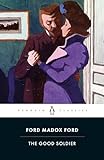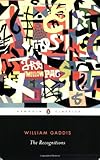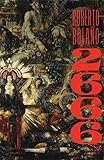Infrequent Millions contributor Buzz Poole has written for numerous publications and is the author of Madonna of the Toast. He is also the proprietor of a blog by the same name.
 Ford Madox Ford’s The Good Soldier furthers what Henry James had begun to chip away at with his novels of manners and paves the way for the modernist dilemmas that comprise the work of Joyce, Beckett, Eliot and Pound. How do individuals define themselves and interact with others when everything they have known changes? John Dowell’s cagey narration folds in on itself and doubles back, making for more questions than answers as the story of two couples besieges what is thought to be the “extraordinarily safe castle” of their lives. As one of the four primary characters, Dowell relates how this quartet’s existence was like a minuet, lives of orderly precision that never inspired questioning, until it was too late. The story is Dowell’s post-mortem report, which is rich with point-of-view tactics and metaphors cribbed by Ford’s successors. As Dowell warns early during his tale: “I don’t know. And there is nothing to guide us. And if everything is so nebulous about a matter so elementary as the morals of sex, what is there to guide us in the more subtle morality of all other personal contacts, associations, and activities? Or are we meant to act on impulse alone? It is all a darkness.”
Ford Madox Ford’s The Good Soldier furthers what Henry James had begun to chip away at with his novels of manners and paves the way for the modernist dilemmas that comprise the work of Joyce, Beckett, Eliot and Pound. How do individuals define themselves and interact with others when everything they have known changes? John Dowell’s cagey narration folds in on itself and doubles back, making for more questions than answers as the story of two couples besieges what is thought to be the “extraordinarily safe castle” of their lives. As one of the four primary characters, Dowell relates how this quartet’s existence was like a minuet, lives of orderly precision that never inspired questioning, until it was too late. The story is Dowell’s post-mortem report, which is rich with point-of-view tactics and metaphors cribbed by Ford’s successors. As Dowell warns early during his tale: “I don’t know. And there is nothing to guide us. And if everything is so nebulous about a matter so elementary as the morals of sex, what is there to guide us in the more subtle morality of all other personal contacts, associations, and activities? Or are we meant to act on impulse alone? It is all a darkness.”
 Four decades later, William Gaddis’s The Recognitions hit the increasingly surreal, overtly commercialized scene, a potent cocktail of Christian morality, creative license and New York City bohemia. Fitting in somewhere between Joyce and Pynchon, Gaddis’s pages read with ease, though he devotes much ink to the blasé poses of just about everyone trying to be someone else. At the center of this carousel of masquerades, painter Wyatt Gwyon, his talent so prodigious, and crippling, he begins to forge the works of Flemish masters. Crafting his own canvases and paints, Gwyon’s lines, shadings and textures fool everyone, even Gwyon, to such a degree that his greatest anxiety, and the novel’s for that matter, is how to create a copy of something that has never existed. The lexicons of the transfiguration, academia, fine art and advertising mingle and bristle – a wonderful novel of ideas, full of jokes, japes and jabs.
Four decades later, William Gaddis’s The Recognitions hit the increasingly surreal, overtly commercialized scene, a potent cocktail of Christian morality, creative license and New York City bohemia. Fitting in somewhere between Joyce and Pynchon, Gaddis’s pages read with ease, though he devotes much ink to the blasé poses of just about everyone trying to be someone else. At the center of this carousel of masquerades, painter Wyatt Gwyon, his talent so prodigious, and crippling, he begins to forge the works of Flemish masters. Crafting his own canvases and paints, Gwyon’s lines, shadings and textures fool everyone, even Gwyon, to such a degree that his greatest anxiety, and the novel’s for that matter, is how to create a copy of something that has never existed. The lexicons of the transfiguration, academia, fine art and advertising mingle and bristle – a wonderful novel of ideas, full of jokes, japes and jabs.

 The Roberto Bolaño bug also bit me this year, the excitement orbiting around 2666 prompting me to finally read The Savage Detectives and then 2666. Both books have been picked apart enough, and my praise for them echoes much of what has already been written and said. But, for me, what has made the emergence of these translations most exciting is Bolaño’s Shakespearean appreciation for jokes. I haven’t seen much exploration of this particular aspect of his writing, but both of these novels brim with humor, from the tense tomfoolery of two writerly rivals dueling on a beach to the darkly vicious jokes of the detectives investigating unsolvable murders: “Then the inspector, exhausted after a night’s work, wondered to himself how much of God’s truth lay hidden in ordinary jokes.” Laughter requires humility, which forces you to put your ego in check, oftentimes easier said than done. Bolaño baits these moments, however, reminding his characters and readers that life, while not a joke, is not a dance. Life is not a prescribed set of steps, but a consistently inconsistent stream of events and happenstance, full of contradictions and confusions, sorrows and the sublime, it can ramble, deviate and detour, and like many jokes, the punch line is not always delivered correctly, or even understood as humorous.
The Roberto Bolaño bug also bit me this year, the excitement orbiting around 2666 prompting me to finally read The Savage Detectives and then 2666. Both books have been picked apart enough, and my praise for them echoes much of what has already been written and said. But, for me, what has made the emergence of these translations most exciting is Bolaño’s Shakespearean appreciation for jokes. I haven’t seen much exploration of this particular aspect of his writing, but both of these novels brim with humor, from the tense tomfoolery of two writerly rivals dueling on a beach to the darkly vicious jokes of the detectives investigating unsolvable murders: “Then the inspector, exhausted after a night’s work, wondered to himself how much of God’s truth lay hidden in ordinary jokes.” Laughter requires humility, which forces you to put your ego in check, oftentimes easier said than done. Bolaño baits these moments, however, reminding his characters and readers that life, while not a joke, is not a dance. Life is not a prescribed set of steps, but a consistently inconsistent stream of events and happenstance, full of contradictions and confusions, sorrows and the sublime, it can ramble, deviate and detour, and like many jokes, the punch line is not always delivered correctly, or even understood as humorous.
Both Gaddis and Bolaño use laughter – at times crass, inappropriate and awkward – because it possesses the tremendous power to disarm you, an effect the characters in Ford’s book would have avoided at all costs. Had Ford’s narrator acknowledged laughter as an invaluable impulse, perhaps the circumstances of his life would not strike him as so strange. But of course, that was Ford’s point. For my taste, too much contemporary fiction forgoes laughter. There just is not enough laughter (smirking at irony doesn’t count), probably because the authors and their characters take themselves too seriously. There’s nothing wrong with being serious, but as Gaddis and Bolaño demonstrate, laughter can morph into the proverbial light in darkness, revealing the unnoticed or unrealized, much of which is serious, though it surfaces when we least expect it, caught off guard in the throes of belly-holding laughter.








